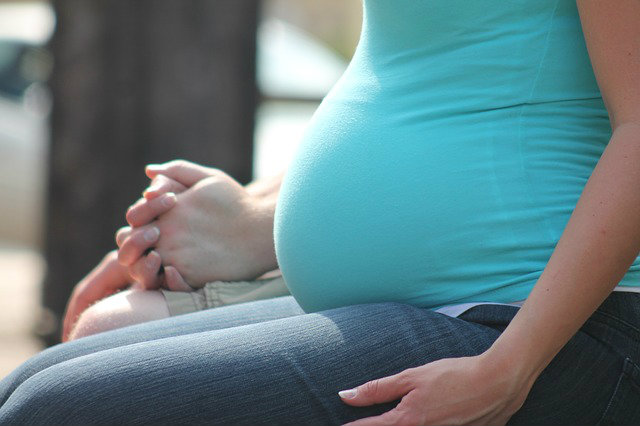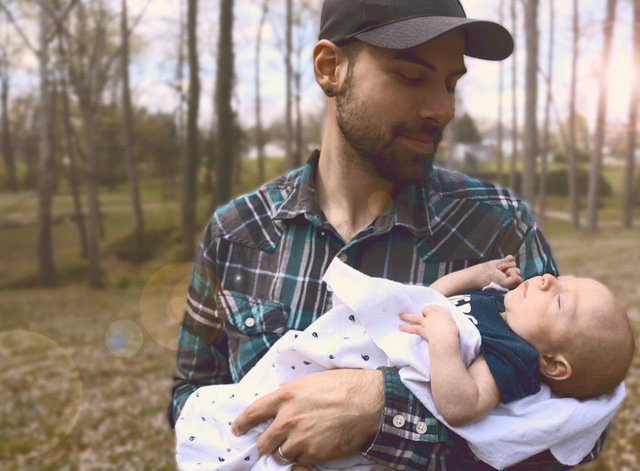 Reading Time: 7 minutes
Reading Time: 7 minutesThe founders of the Whole Life Challenge, Andy Petranek and Michael Stanwyck, got me pregnant.
I mean, my wife had a baby because of them.
This explanation isn’t going as I’d planned. Let me try again.
I attribute the birth of our son to the Whole Life Challenge. Andy and Michael weren’t there for any of it, but they probably helped.
Quick note: If you don’t understand the lame jokes I’ve made up to this point, please stop reading and go talk to your parents/legal guardians. Ask them for the “birds and the bees talk.” They’ll know what that means. Ignore their flop sweats.
The Birds and the Bees: A Quick Refresher
Let me rewind for a hot minute. Assuming you didn’t sleep through health class, we all know how humans are made, right? Sperm meets egg, nine months of pregnancy ensues, and voila: baby. It’s pretty simple. Well, what is simple is not always easy. I think someone important said that.
When you look a little closer at what it takes to actually form a human, it’s a wonder any of us are even here. Seriously. Assuming you’ve pulled all the goalies (i.e., ceased using birth control), millions of sperm get weeded down to about 200 swimmers that reach the egg. Out of those (roughly) 200 finalists, one sperm has to be perfect enough to crack through and combine genetic material with the egg. Not to mention, the egg has to be at the right stage of the menstrual cycle to be receptive (i.e., ovulation). In a healthy female, ovulation happens once a month, so you only have twelve times per year to make a baby happen, and any number of factors can throw off that incredibly specific equation. (We’ll get into that in a minute.) It’s quite the obstacle course, if you ask me.
While I feel beyond blessed to be a parent, there are thousands more people who are not so lucky and by no means are they at fault. This is our story — one couple’s anecdotal presentation — of how a few changes inspired by the Whole Life Challenge most likely helped in the process of us having a child.
Our Story
Without going into too much personal detail, my wife and I weren’t traversing through the above outlined obstacle course so well when we were trying to get pregnant. We were frustrated. How could we be denied such a simple, primal part of life? We retired all forms of birth control. We were both healthy. I stopped putting my cell phone in my front pocket. We kept a calendar. We had been consciously trying for several months. Things just weren’t happening.
Coincidentally, another session of the Whole Life Challenge was about to start up. I’d played a few times previously and decided to register again as I’ve always found it to be a positive tool in refocusing my daily lifestyle. Being supportive and presumably wanting to have some say in our meals for the duration of the Challenge, my wife decided to join as well. Neither one of us made any sort of conscious connection to possible fertility benefits.
Fast forward a bit and – HUZZAH – a proverbial (WLC-compliant) bun was in the oven!
After looking back at our previous efforts, it dawned on us very clearly: the Whole Life Challenge and the adjustments therein helped us make a baby. The Whole Life Challenge is basically the Barry White of lifestyle practices. While we can’t prove it is the exact reason we got pregnant, it certainly put us on the right course for baby makin’. And here’s how.
Good Grub
Personally speaking, the biggest shift in my daily practices while partaking in the Whole Life Challenge was the dietary adjustments. When left to my own devices, I get pretty lazy in the kitchen. That is, if I even set foot in the kitchen rather than hitting up a favorite take-out spot.
Recent studies done by Dr. Ashok Agarwal, head of reproductive medicine at The Cleveland Clinic, have linked consuming antioxidants to reducing oxidative stress. Oxidative stress affects sperm viability, motility, and DNA, and therefore causes infertility. To summarize that a bit, they’ve found that eating antioxidants can most likely help increase fertility. More tests are needed, according to the study, but I can tell you one thing my take-out regimen didn’t include much of: antioxidants.
As it turns out, frequenting the organic section of the fruit and vegetable aisles also helps in the fertility department. Until I did a little more research, I didn’t really see the wisdom of the whole organic “craze” — I thought it was just a way for Whole Foods to take more of my hard-earned money. But, as it turns out, going organic is important. Sadly, numerous studies have linked pesticides (i.e., nasty stuff on food that is not organic) with infertility, among other things. There’s a great summary on this done by Kristin Schafer of Physicians for Social Responsibility, which can be found here.
The bottom line is that pesticides, while seemingly effective in doing what pesticides are designed to do, carry numerous negative side effects on the part of the consumer. By going organic, we dodged the pesticides altogether.
So you can see right there, just trying to get our five points for nutrition every day – and doing so organically – was already a giant step in the right direction, not only for our general health, but presumably also for our fertility.
Ya Gotta Work Work Work…
Consistently scoring well in the exercise category of the Whole Life Challenge helped us as well. It’s been found that excess body fat can lead to an overproduction of certain hormones that disrupt ovulation (causing less regular and/or frequent ovulation), while also hindering testosterone production in males. It’s been found that daily exercise can increase testosterone production in males. Hormonally-speaking, that ten minutes of exercise per day was more important than we realized.
H2Oooooh!
Let’s also not forget about all those pesky water intake points. Certainly the Whole Life Challenge isn’t the first methodology for health and wellness that has told us to drink more water. But why? And why does it matter for the sake of fertility?
Well, those baby-making hormones need a way to be reliably transported and that’s where water comes in. All that water stimulates circulation, which improves egg health while also moistening cervical mucus, which is a key component in making the egg receptive for that one lucky sperm.
Get Some Zs
And while we’re talking about hormones, leptin is the hormone that is responsible for ovulation in women. Adequate sleep is needed for proper leptin production (as well as other hormones such as progesterone and estrogen), but if leptin production is compromised, the menstrual cycle can be disrupted. Similar hormonal issues also occur in men who are sleep deprived.
Let’s also not forget how libido drops on both sides of the bed if one or both partners aren’t getting the sleep they need. As it turns out, turning off Netflix and getting that extra hour of sleep was probably doing more than just making me more pleasant in the morning.
Namaste
Since so much of fertility depends on said hormones, keeping them in check is obviously vital to both the male and female side of the process. There are some conflicting medical opinions revolving around whether or not stress has anything to do with infertility. Without getting into the science (I’m just a baby maker, not a doctor or medical researcher), it is a well-known fact that meditation and mindfulness can level out stress and thus keep hormone levels where they need to be.
I often think about this when I’m trying to fit the Challenge’s inevitable meditation week into my (seemingly full) schedule. If meditation helps with something as important as my hormone levels and my sperm count, what are the other benefits? I’ve found that I also enjoy a certain amount of meditation during my mobility work as well. So by participating in the Whole Life Challenge, it’s likely that my wife and I both decreased our stress levels and put our hormones at ease.
The Clarity of Hindsight
Looking back at our experience with our first pregnancy, it’s highly probable that The Whole Life Challenge came through for us. So while I can’t guarantee that the WLC will score you any booty (new article idea, perhaps?), it might just help you out if you’re trying to make a human. It certainly can’t hurt.








